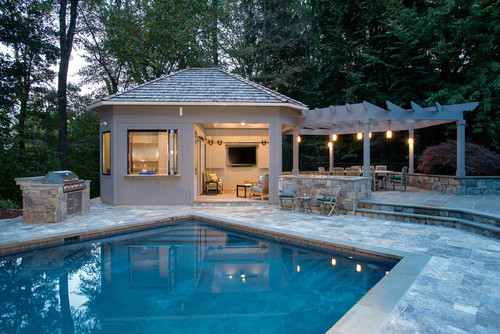Saltwater Swimming Pool
Saltwater chlorination is a simply process. The saltwater system produces sanitizer directly in the water using a very low voltage electrical current. A low concentration of salt (NaCl) in the water is required to make the system work. The resulting chemical reaction eventually produces hypochlorous acid (HClO) and sodium hypochlorite (NaClO), which are the sanitizing agents.

Photo by MARK IV Builders, Inc – Search pool design ideas
When the sanitizer is used up it transforms back into salt and the process starts again.
The recommended unit of saltwater chlorination is the type requiring that salt be added to the pool. There are two types of these units. One has the chlorine-producing cell and the electronics installed at the equipment while the other has the cell installed in the deck near the pool with the electronics usually located at the equipment.
Advantages of Saltwater System:
1| Saltwater is an expense when it is installed, but after that you do not have to add chlorine as salt makes chlorine.
2| No toxic chemicals to buy, no chlorine smell. Drastically reduces the cost of purchasing chlorine chemicals and or sanitizing agents.
3| Minimizes the risks involved in the handling and storing of dangerous chlorine chemicals – A blessing for families with young children.
4| At a first glance, the new salt systems are great, as they monitor and clean themselves.
5| You also do not have the obnoxious little floater in your pool all the time with salt.
6| Lightly salted water softer your skin. Your hair won’t turn those funny colors that a chlorine pool causes.
7| A saltwater pool is less irritating to the eyes than a chlorinated pool.
8| The salt content in a saltwater pool is about the same as the salt content in human body. No harm for human being. They create a better, healthier swimming experience for most people.
9| Saltwater requires low maintenance. Only you still must maintain correct water balance, and you must maintain the chlorine generator.
10| Saltwater can help fight against waterline scum build-up.
Disadvantages of Saltwater System:
1| Because saltwater pools produce chlorine, the sanitizing effectiveness of the system is affected by sunlight, rainfall, temperature and calcium buildup. If there are any changes of these conditions we can have an algae bloom in our pool.
2| Costs of saltwater swimming pools and installation are high initially.
3| In the last time are a growing concern that salt (through chloride) accelerates the destruction of stone and cement.
In the same time the electrolysis process are causing rapid deterioration of metals in your pool.
1| The salt never leaves your pool by evaporation, nor is it ever used up. The only way that saltwater leaves your pool is through back-washing. Back-washing saltwater pools can sterilize soil and kill plants.
2| A serious problem is the staining and corrosion of heaters and pool equipment.
3| Water splashes out of pool and then evaporates, leaving salt behind. As that salt builds up, it can damage certain types of rock such limestone.
If you’re thinking about installing a swimming pool in your home, you might want to consider a salt water pool. But think about cost. The installation of a salt water pool requires some initial upfront costs. However, the savings over time on chemicals and weekly treatments and cleaning will amortize.
When it comes to deciding whether to opt for a traditional chlorine pool or a salt water system, look closely at the advantages and disadvantages of both and what would best suit your requirements.
Solar Panel System for Swimming Pool – Tips and Ideas (howtobuildahouseblog.com)


